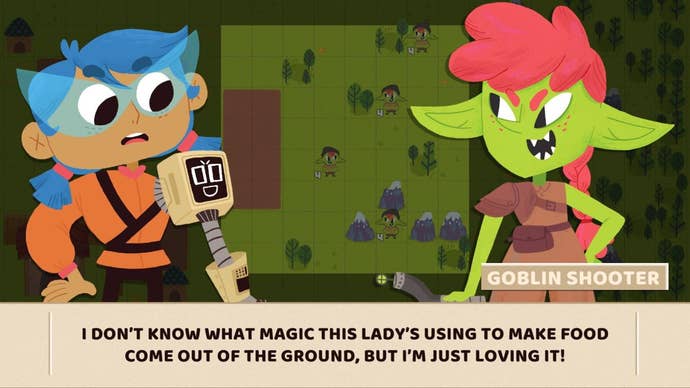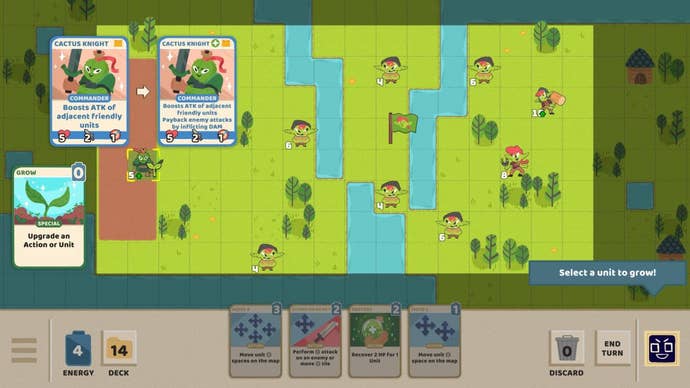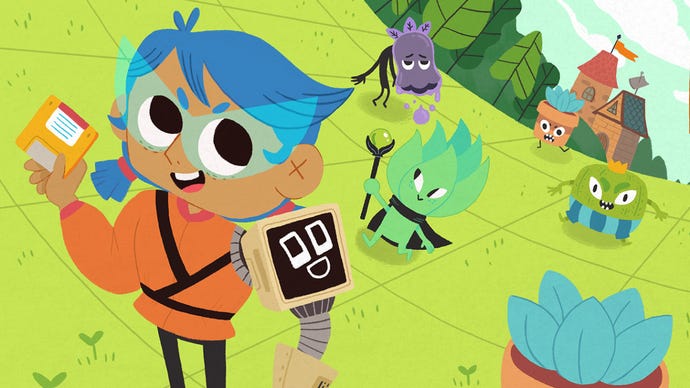Floppy Knights is a Cheerful Tactics Game About Deckbuilding and Floppy Disks
This blend of cards and combat isn't all doom and gloom.
This article first appeared on USgamer, a partner publication of VG247. Some content, such as this article, has been migrated to VG247 for posterity after USgamer's closure - but it has not been edited or further vetted by the VG247 team.
War is grim, even the virtual kind. Many of the best tactics games delve into the arduous toll of war on soldiers and the world, where death is commonplace and sorrow inevitable.
Rose City Games' Floppy Knights is not that kind of tactics game. Floppy Knights is a deckbuilding tactics game seemingly built to stand opposite the dark, brooding epics; it's about a plucky girl and her trusty robot companion, sending armed flora into battle to fight quirky, snarky goblins.
It's also easy to intuit at a glance, neatly laid out, and infectiously chipper. Floppy Knights is easily the most optimistic game about strategic combat I've played in some time, while also appealing to players who don't often play these kinds of games. Creative Director Marlowe Dobbe says the team was looking to make something that's accessible, both in gameplay and in general aesthetic.
"It's not really like [a] doom-and-gloom intimidating tactics game that has a million menus so you can understand one status effect. It still gives you the same good brain-feel of playing a tactics game, but it's kind of like, a nice, soft packaging," says Dobbe.
Sitting down for a demo at PAX East 2020, it's easy to see the draw. It's an Advance Wars-inspired tactics game, where units move around on a square grid and attack each other. The twist, beyond the adorable art, is building a deck for protagonist Phoebe to use in each level.
Every turn, you draw a hand and can play cards, the basis for all of your actions. Sometimes, this means placing a new unit on the field; other times, it's how you command your units to move and attack. All of it is metered by the amount of energy you have to expend each turn. Once the deck is depleted, the discard pile gets shuffled and fed back in; if you've played something like Slay the Spire, the card-side loop should feel very familiar.
The result is a marriage between tabletop-style card game design and the virtual tactics playing out on the squared grid above. Each side feels like it builds on the other, with cards enabling movement and action in tactics and shifts in the battlefield changing which cards I want to play or discard.

Floppy Knights' mix of deckbuilding and tactics is easy to parse, but the random elements keep things fresh from map to map. In one, I had to rely on a small squad of weak potted plants, who made up for their brawn with sheer numbers and kicks. In another, I put my focus on a ragtag squad, boosted up by the Grow card—the plant deck's special card which can upgrade an action or unit card for no cost. My Commander, the cornerstone of the deck and who's crucial to keep alive in fights, was loaded up with Payback, which threw damage back at attackers. The Cactus Knight became a brick wall that absorbed the last brunt of enemy attacks to win. As Dobbe puts it, the deckbuilding and randomness mixed with a traditional tactics setup is like two great flavors that go great together.
"I've been describing it as, you get the really good brain-feeling from playing a tactics game and doing all this math, and looking at your options," Dobbe says. "And you get that same, very similar feeling in doing strategy and deck-building. Having tactics with this sort of pseudo-random element, to keep it replayable, felt like a really good fit to us."
The Grow card in particular puts an interesting spin on things, as you can use it to upgrade a card in your hand or a unit already on the field. Now you're choosing whether a free attack or an upgrade to a weak unit is the better choice. It might make for some decision paralysis, but you can only buff a unit once, so instead it becomes a small and interesting decision to make every time it comes up, rather than a resource you're scared to spend. It's a "free play" that Dobbe says is encouraging players to have a more "holistic" view of the deck, rather than focus on certain cards.

Floppy Knights' mix of genres is what makes it appealing, but its little design choices like the Grow card that give me hope for what it can become. Dobbe says there will be more decks than just the plants with their own special mechanics, and I'm interested to see how those turn out.
Right now, the plan is for a campaign that goes through sequential levels, possibly with some extra challenges to receive different cards for beating levels in certain ways. I asked about the potential of a map creator or other tools, and although Dobbe likes the idea, there aren't plans for that at the moment.
What makes Floppy Knights appealing is how it's blending concepts together so well. Lately, there's been renewed interest in tactics games, especially in the independent development scene. As a sort-of "renaissance" in indie tactics games blossoms, Floppy Knights looks poised to stand out, both through its art and gameplay.
"I think you're seeing more and more smaller studios like, 'Oh yeah, we grew up with these games. Let's put our own spin on it,'" Dobbe says. "So you're seeing tweaked versions of a system you're already kind of familiar with. It's really exciting to be a part of that, and also just making the type of game that I want to play."
Incorporating deckbuilding mechanics, straightforward but effective tactics, and accessible gameplay makes for a tactics game I wanted to keep playing through, even after beating the demo levels. Unfortunately, it might be some time until I'm able to, as Floppy Knights doesn't have a release date at the moment.


